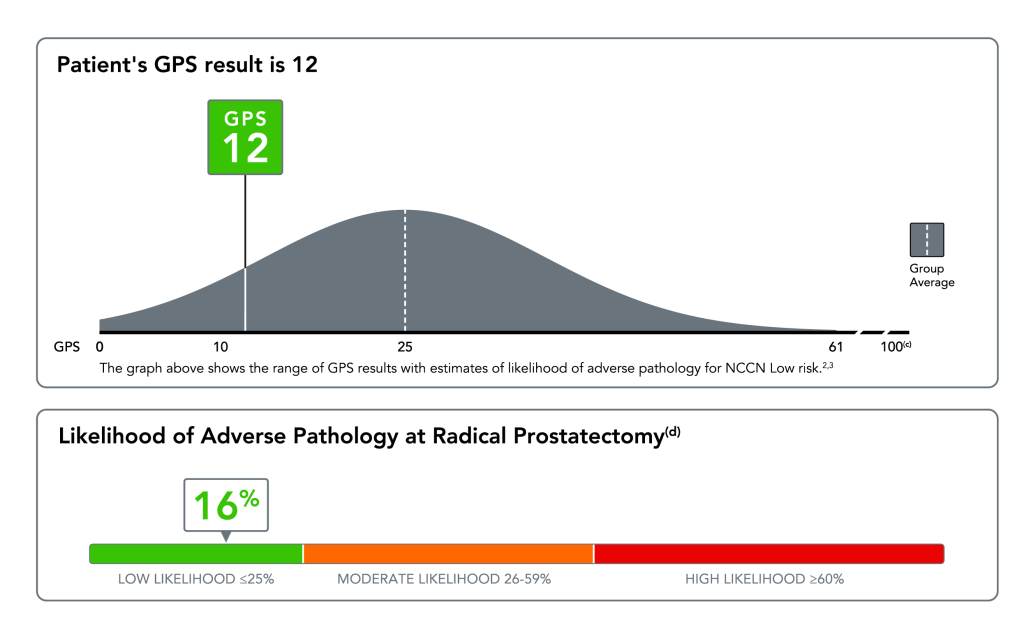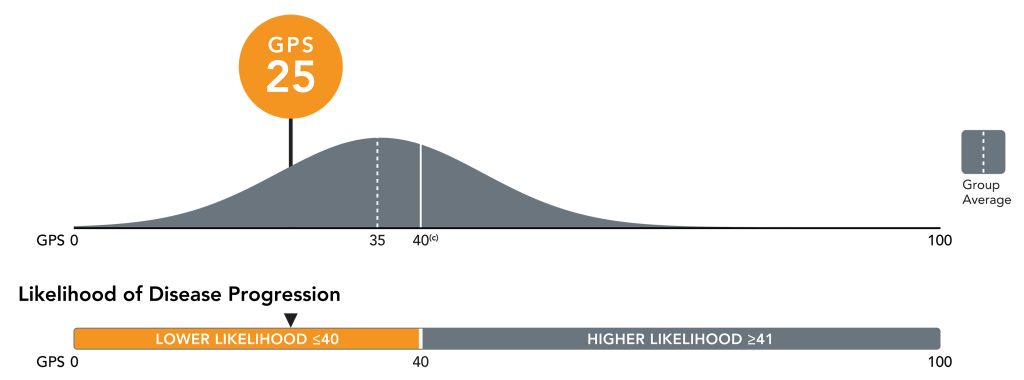Clinical Evidence
Measure what matters in your low-risk patients
The Genomic Prostate Score (formerly Oncotype DX GPS) test includes the most robust definition of adverse pathology, which is a strong predictor of long-term endpoints.1
A universal endpoint
Standard risk assessment tools for localized prostate cancer, such as biopsy, imaging, and PSA, can aid in assessing a patient’s risk of harboring adverse pathology or its components.
A unique assay
The GPS test is the only genomic test to provide the risk of adverse pathology as well as the risks of its components (pT3a+ and Gleason ≥ 4+3).5
A useful definition
Extra prostatic extension (pT3a+ disease or higher) is included in the GPS assay’s definition of adverse pathology, which is important because it is a strong predictor of distant metastasis.2
Endpoints Data
The presence of adverse pathology at radical prostatectomy (RP) is a near-term endpoint that’s strongly prognostic for long-term outcomes.1
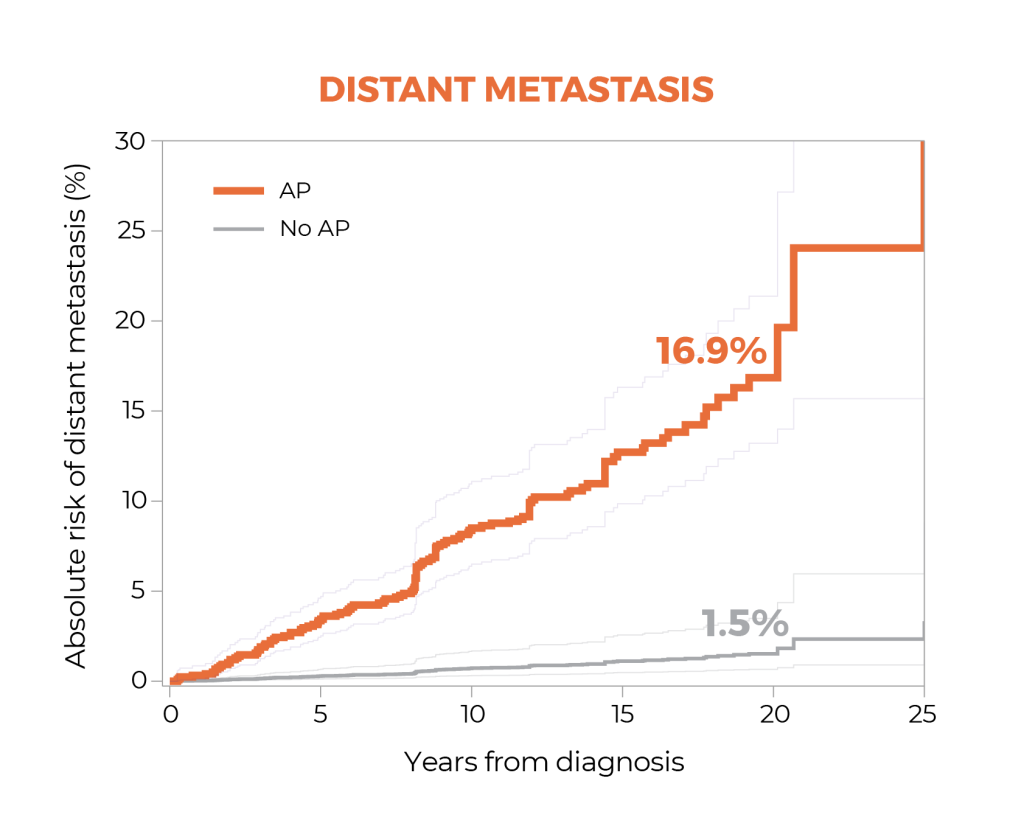
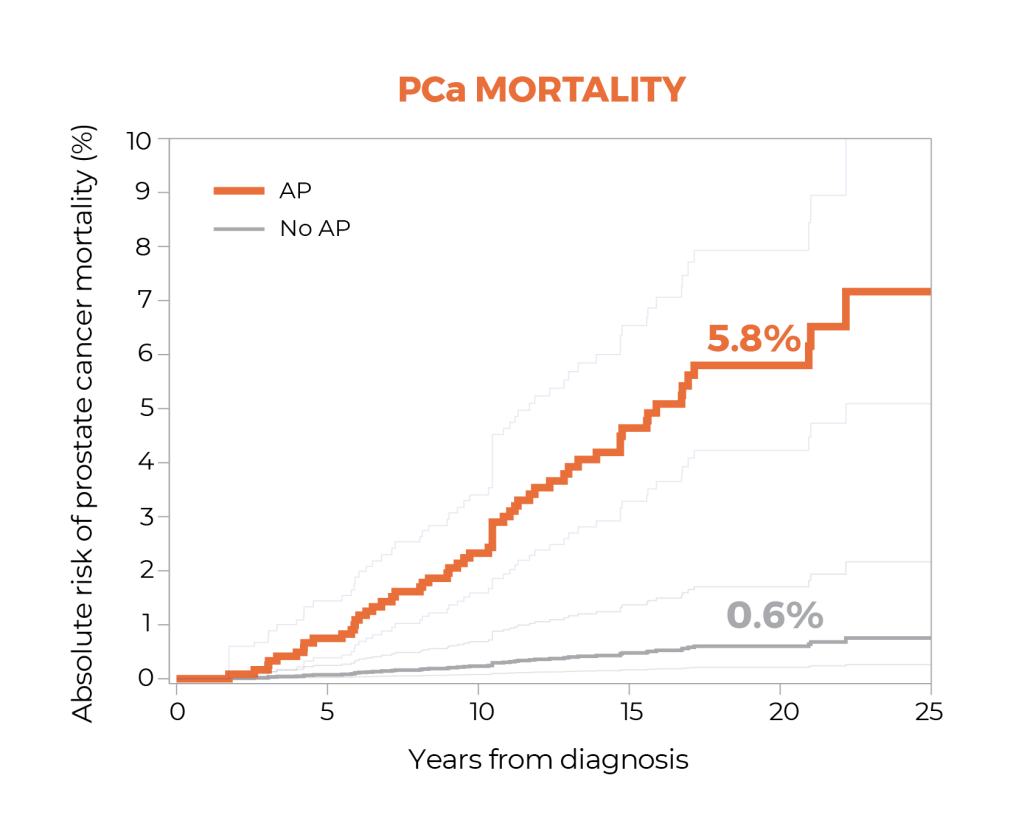
Outcomes Data
The GPS test was associated with up to 20-year outcomes.3
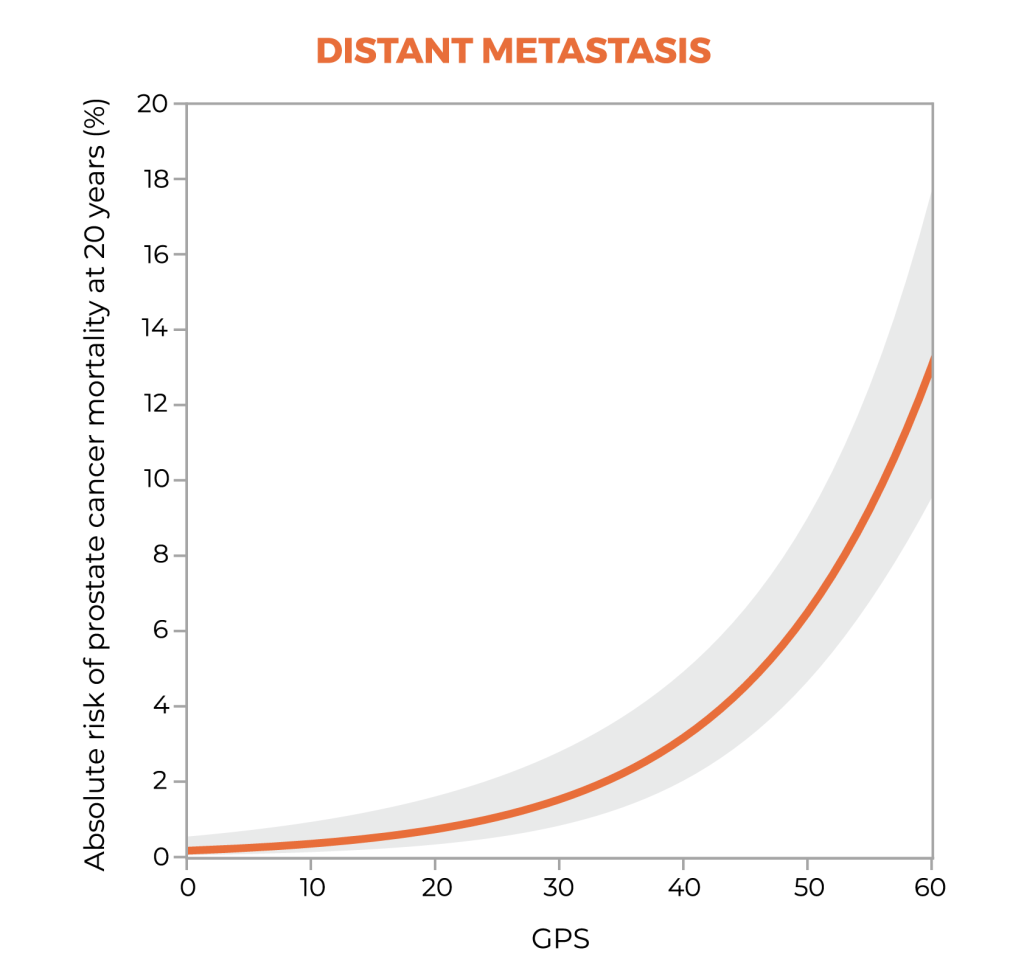
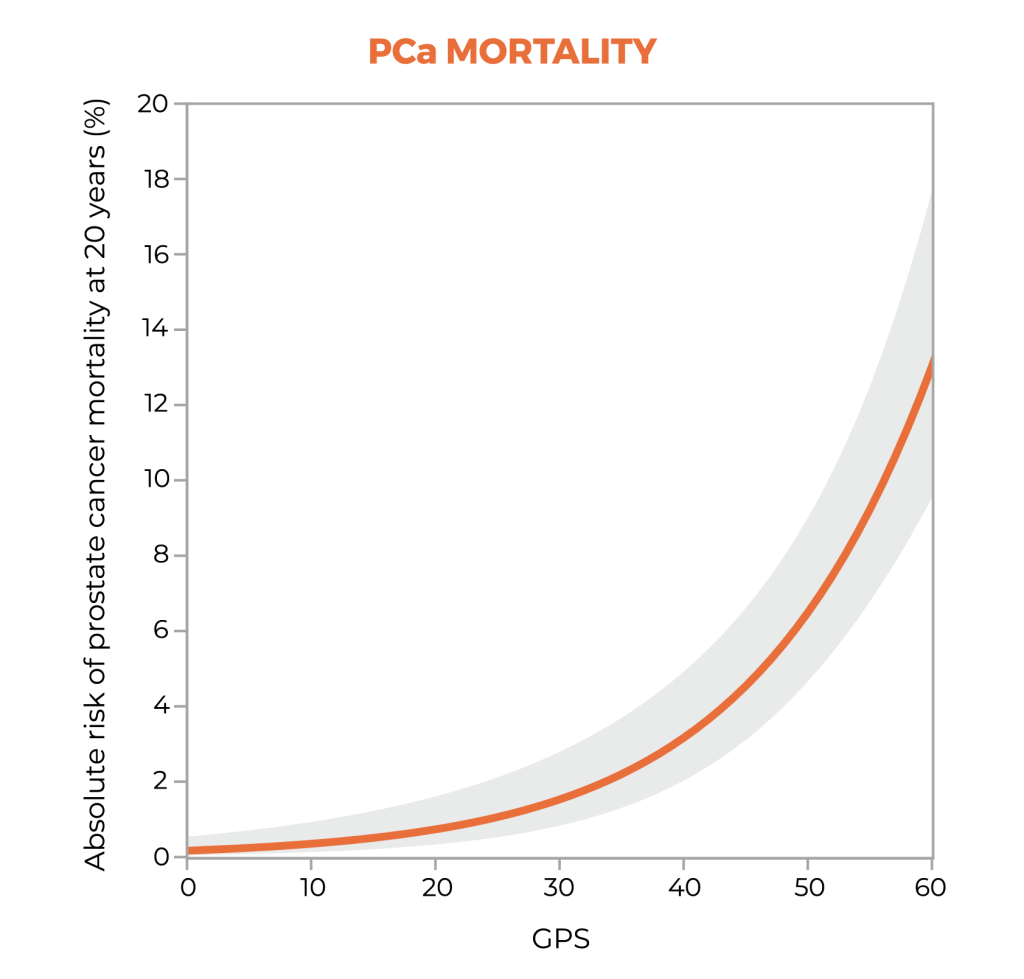
Long-term data show the clinical utility of stratifying risk with the GPS test.3
20-year outcomes1,3
A study suggests that the GPS™ test may be prognostic for both distant metastasis and prostate cancer-specific mortality through 20 years after diagnosis, and that the GPS test together with clinical factors may improve risk assessment over clinical factors alone.1
In a large cohort of men with largely clinically low-risk prostate cancer treated with radical prostatectomy, the study suggests the presence of adverse surgical pathology significantly predicted 20-year risk of metastasis and prostate cancer-specific mortality. Patients with adverse pathology at radical prostatectomy had a 12-fold higher risk of metastasis than those with favorable pathology, demonstrating the value of this endpoint for assessing risk in this population.1
Measure what matters in your high-risk patients
The GPS test is clinically validated to answer key questions in the high-risk setting with endpoints that guide decision making.4,5
PROVIDES prognostic information about a patient’s individual risk of death and metastasis within 10 years of RP4,5
The GPS test can help you determine the appropriate level of treatment by knowing the likelihood of disease progression.4,5
Endpoints Data
The GPS test provides a score that is strongly predictive of adverse outcomes in high-risk patients.4,5
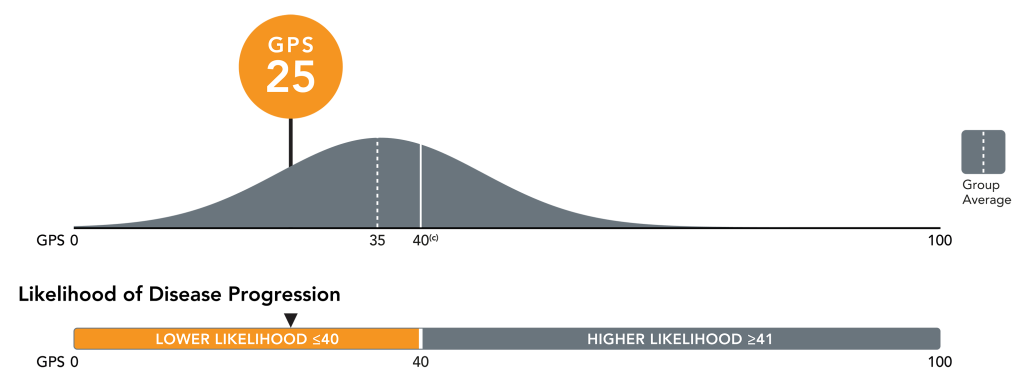
New High Risk Patient Report is now available.
Precise risk assessment for informed treatment planning with the GPS cut point4
- For patients with lower risk levels (≤40), monotherapy or minimization of combination therapy may be sufficient
- For patients with higher risk levels (>40), a more aggressive therapy approach may be appropriate
Outcomes Data
The GPS cut point is validated to stratify patients into categorical risk groups above and below 40 that are strongly associated with disease progression in clinically high risk patients.4
- Patients with a GPS result of ≤40 had outcomes similar to those with favorable intermediate disease; patients with a result of >40 had outcomes resembling those with high-risk disease.4
Rigorous development and clinical validation
The GPS was developed in collaboration with the Cleveland Clinic and the University of California, San Francisco (UCSF) to specifically address the many challenges inherent to prostate cancer risk assessment.6
The genes composing the GPS test were chosen for their6:
- Correlation with tumor aggressiveness regardless of multifocality or heterogeneity
- Performance in biopsy samples with small tumor volume

Over 9000 patients have been included in development studies, clinical validation studies, and clinical utility studies.6-23
Clinical Validation Studies
The clinical validation studies for the GPS test were prospectively designed studies of archival tissue from a large, diverse set of data sources:
- Kaiser Permanente, Northern California (KPNC) (N=259)8
- University of California, San Francisco (UCSF) (N=395)6
- Center for Prostate Disease Research (CPDR) (N=402)7
A meta-analysis combining the UCSF and CPDR cohorts (N=732)24 provided more precise estimates for likelihood of adverse pathology.
See the benefits of integrating the test into your practice
The impact of the GPS test on treatment planning has been demonstrated in multiple clinical utility studies.11,12
Prospective study
Assessed changes in urologists’ treatment recommendations pre- and post- GPS test results. This decision-impact study demonstrated a 26% absolute change in management recommendations. Physician confidence improved in 85% of cases.11
Retrospective study
Compared 6-month management received in clinically low-risk patients with and without the GPS test results. This chart-review analysis revealed a 56% relative increase in the number of patients on active surveillance/watchful waiting at 6 months post-diagnosis when GPS testing was added to standard decision-making tools.12
- Brooks MA, Thomas L, Magi-Galluzzi C, et al. Validating the association of adverse pathology with distant metastasis and prostate cancer mortality 20-years after radical prostatectomy. Urol Oncol. 2022;40(3):104.e1-104.e7.
- Mehralivand S, Shih JH, Harmon S, et al. A grading system for the assessment of risk of extraprostatic extension of prostate cancer at multiparametric MRI. Radiology. 2019;290(3):709-719.
- Brooks MA, Thomas L, Magi-Galluzzi C, et al. GPS assay association with long-term cancer outcomes: twenty-year risk of distant metastasis and prostate cancer-specific mortality. JCO Precis Oncol. 2021;5:PO.20.00325.
- Cullen J, Kuo HC, Shan J, Lu R, Aboushwareb T, Van Den Eeden SK. The 17-gene genomic prostate score test as a predictor of outcomes in men with unfavorable intermediate risk prostate cancer. Urology. 2020;143:103-111.
- Data on file.
- Klein EA, Cooperberg MR, Magi-Galluzzi C, et al. A 17-gene assay to predict prostate cancer aggressiveness in the context of Gleason grade heterogeneity, tumor multifocality, and biopsy undersampling. Eur Urol. 2014;66(3):550-560.
- Cullen J, Rosner IL, Brand TC, et al. A biopsy-based 17-gene genomic prostate score predicts recurrence after radical prostatectomy and adverse surgical pathology in a racially diverse population of men with clinically low- and intermediate-risk prostate cancer. Eur Urol. 2015;68(1):123-131.
- Van Den Eeden SK, Lu R, Zhang N, et al. A biopsy-based 17-gene genomic prostate score as a predictor of metastases and prostate cancer death in surgically treated men with clinically localized disease. Eur Urol. 2018;73(1):129-138.
- Eggener S, Karsh LI, Richardson T, et al. A 17-gene panel for prediction of adverse prostate cancer pathologic features: prospective clinical validation and utility. Urology. 2019;126:76-82.
- Lin DW, Zheng Y, McKenney JK, et al. 17-gene genomic prostate score test results in the Canary Prostate Active Surveillance Study (PASS) cohort. J Clin Oncol. 2020;38(14):1549-1557.
- Badani KK, Kemeter MJ, Febbo PG, et al. The impact of a biopsy based 17-gene genomic prostate score on treatment recommendations in men with newly diagnosed clinically prostate cancer who are candidates for active surveillance. Urol Pract. 2015;2(4), 181-189.
- Dall’Era MA, Maddala T, Polychronopoulos L, Gallagher JR, Febbo PG, Denes BS. Utility of the Oncotype DX® prostate cancer assay in clinical practice for treatment selection in men newly diagnosed with prostate cancer: a retrospective chart review analysis. Urol Pract. 2015; 2(6), 343-348.
- Albala D, Kemeter MJ, Febbo PG, et al. Health economic impact and prospective clinical utility of Oncotype DX® Genomic Prostate Score. Rev Urol. 2016;18(3):123-132.
- Eure G, Germany R, Given R, et al. Use of a 17-gene prognostic assay in contemporary urologic practice: results of an interim analysis in an observational cohort. Urology. 2017;107:67-75.
- Lynch JA, Rothney MP, Salup RR, et al. Improving risk stratification among veterans diagnosed with prostate cancer: impact of the 17-gene prostate score assay. Am J Manag Care. 2018;24(1 Suppl):S4-S10.
- Leapman MS, Westphalen AC, Ameli N, et al. Association between a 17-gene genomic prostate score and multi-parametric prostate MRI in men with low and intermediate risk prostate cancer (PCa). PLoS One. 2017;12(10):e0185535.
- Kornberg Z, Cowan JE, Westphalen AC, et al. Genomic Prostate Score, PI-RADS™ version 2 and progression in men with prostate cancer on active surveillance. J Urol. 2019;201(2):300-307.
- Salmasi A, Said J, Shindel AW, et al. A 17-gene genomic prostate score assay provides independent information on adverse pathology in the setting of combined multiparametric magnetic resonance imaging fusion targeted and systematic prostate biopsy. J Urol. 2018;200(3):564-572.
- Magi-Galluzzi C, Isharwal S, Falzarano SM, et al. The 17-gene genomic prostate score assay predicts outcome after radical prostatectomy independent of PTEN status. Urology. 2018;121:132-138.
- Cullen J, Lynch JA, Klein EA, et al. Multicenter comparison of 17-gene genomic prostate score as a predictor of outcomes in African American and Caucasian American men with clinically localized prostate cancer. J Urol. 2021;205(4):1047-1054.
- Murphy AB, Carbunaru S, Nettey OS, et al. A 17-gene panel genomic prostate score has similar predictive accuracy for adverse pathology at radical prostatectomy in African American and European American men. Urology. 2020;142:166-173.
- Covas Moschovas M, Chew C, Bhat S, et al. Association between Oncotype DX genomic prostate score and adverse tumor pathology after radical prostatectomy. Eur Urol Focus. 2021;S2405-4569(21)00094-8.
- Aboushwareb T, Bennett J, Yuan Y, et al. Active surveillance or watchful waiting in clinically low-risk prostate cancer patients in the SEER database with and without an Oncotype Dx genomic prostate score assay. J Urol.2021;206(3S):e1094 (MP62-06).
- Brand TC, Zhang N, Crager MR, et al. Patient-specific meta-analysis of 2 clinical validation studies to predict pathologic outcomes in prostate cancer using the 17-gene genomic prostate score Urology. 2016;89:69-75.





